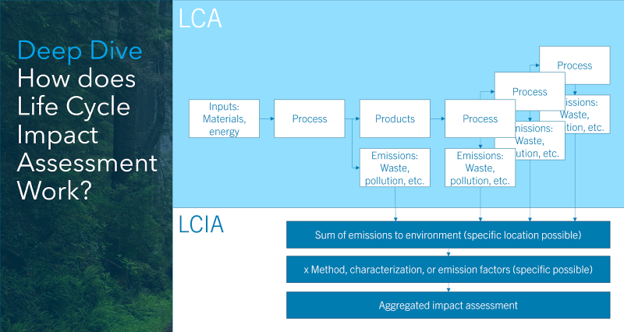The Essential Guide to Life Cycle Assessment (LCA) for SMEs
What is Life Cycle Assessment (LCA)?
LCA is a method to estimate the environmental impact of products, activities, and organizations across their “lifecycles.” This means that LCA captures impacts not just from a company’s direct actions, but from their supply chain, and when a product is used as well. Sometimes, this is called “from cradle to grave.”
Why does LCA matter to businesses?
The demand for LCAs is growing from all directions. This is partially due to
Many new and emerging regulations in the EU require LCAs for compliance (such as the CSRD or EU Taxonomy for Sustainable Finance), especially for larger companies
Many larger companies report their environmental impacts in voluntary schemes such as GRI or CDP. These sometimes require deeper insights into supply chains, such as for scope III greenhouse gas emissions which LCAs are well suited to address.
Alongside voluntary reporting, many large companies have made sustainability commitments, including in their value chains. LCAs are an important tool for measuring and improving value chain impacts over time.
While much demand is coming from larger businesses, the need for visibility into the supply chains reaches small and medium sized business too. Proactively sharing sustainability data to support LCAs is a critical differentiator for suppliers of large companies.
What can a small or medium size business do?
For SMEs, proactively sharing sustainability data to support your clients is a critical differentiating factor. In addition, this data will help you improve your own business performance, further strengthening your business. Sustainability transparency is no longer a nice-to-have, but a need-to-have for businesses of all sizes.
Practically, what can you do? SMEs have a range of options depending on cost, and customer demands:
Partner with an expert This is the most expensive, but most robust option
Do-it-yourself This option is also expensive, but scalable. You can invest in LCA software, databases, and training to learn how to create your own. This is especially helpful for medium sized businesses that have many SKUs to cover.
Prepare basic data is your most practical option. Rather than conducting your own costly LCA, prepare for customer inquiries ahead of time by compiling the basic data. When your customers conduct their own LCAs, they will often send data requests. By proactively compiling the data you’re comfortable sharing, you can minimize the time investment while positioning your business ahead of the competition. We can help.
We recommend taking a smart approach to proactively share data with your key customers about your environmental impacts. This saves considerable budget that would otherwise be spent on LCAs by experts, and still helps differentiate you from the competition. Demonstrate that your business is ahead of sustainability with our Quick Sustainability Assessment today, and contact us for a consultation on proactive data sharing for your customers.
A technical guide to LCA
How does LCA work?
LCAs are models, built by connecting “processes” to represent the activities along the value chain. Processes simulate the activities transforming products along the supply chain, as well as the emissions of substances to soil, water, and air that may occur along the way.
These emissions are aggregated across the entire value chain of the LCA, and translated from amounts of substances into environmental impacts in Life Cycle Impact Assessment (LCIA). Depending on the method used, it is possible to capture a wide range of environmental impacts from climate change / carbon accounting, to pressure on biodiversity.
Where does LCA “process” data come from?
There are two types of “process” data used to build LCA models:
Industry averages and data published in commercial databases are often used when its difficult to collect first-hand information about a step of the supply chain. While using this data can be faster, it doesn’t differentiate great performers within an industry. Therefore, many large companies are starting to investigate getting better, first-hand information to make better decisions in their supply chain.
First-hand data is the gold standard for LCA. This is the information about your immediate operations, which can differentiate you from your competitors.
For the “methods” of impact assessment, there are many well-studied methods available such as the European Commission’s Joint Research Center’s EF methods. These impact assessment methods and their underlying data are typically standardized.
What types of LCAs are there?
“Cradle to grave” is often used to describe LCAs, but that’s only one of several types of LCAs available. Choices can be made around how deep or far into the value chain to explore:
“Cradle to gate” captures only the supply chain, and not the use phase, for example, raw material extraction and manufacturing.
“Gate to gate” captures midstream activities, such as manufacturing through sale
“Cradle to grave” captures the full value chain, including both raw material extraction, manufacturing, transportation, and the use of a product.
To add to the complexity, there are different rigors for LCAs depending on how you would use it:
Compare products: Some industries in the EU have developed Product Environmental Footprint Category Rules (PEFCRs) to ensure that any claims made about a product is comparable.
Marketing claims: ISO-certified LCAs generally must be prepared by an expert, then peer-reviewed on a deeply technical basis by another expert. For public claims, this is a robust method to ensure that the claim is legally valid.
Improve operations: A “screening” LCA built with readily available data in databases can help make choices between different material types, or when integrated into tools such as “ecodesign” or “safe and sustainable by design.”
Ready for the next step?
We recommend taking a smart approach to proactively share data with your key customers about your environmental impacts. This saves considerable budget that would otherwise be spent on LCAs by experts, and still helps differentiate you from the competition. Demonstrate that your business is ahead of sustainability with our Quick Sustainability Assessment today, and contact us for a consultation on proactive data sharing for your customers.


